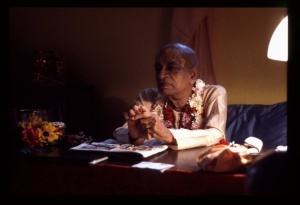CC Adi 10.131

A.C. Bhaktivedanta Swami Prabhupada
TEXT 131
- kāśī-miśra, pradyumna-miśra, rāya bhavānanda
- yāṅhāra milane prabhu pāilā ānanda
SYNONYMS
kāśī-miśra — Kāśī Miśra; pradyumna-miśra — Pradyumna Miśra; rāya bhavānanda — Bhavānanda Rāya; yāṅhāra — of whom; milane — meeting; prabhu — the Lord; pāilā — got; ānanda — great pleasure.
TRANSLATION
In the list of devotees at Jagannātha Purī [which begins with Paramānanda Purī, Svarūpa Dāmodara, Sārvabhauma Bhaṭṭācārya and Gopīnātha Ācārya], Kāśī Miśra was the fifth, Pradyumna Miśra the sixth and Bhavānanda Rāya the seventh. Lord Caitanya took great pleasure in meeting with them.
PURPORT
In Jagannātha Purī Lord Caitanya lived at the house of Kāśī Miśra, who was the priest of the King. Later this house was inherited by Vakreśvara Paṇḍita and then by his disciple Gopālaguru Gosvāmī, who established a Deity of Rādhākānta there. The Gaura-gaṇoddeśa-dīpikā (193) states that Kāśī Miśra was formerly Kubjā in Mathurā. Pradyumna Miśra, an inhabitant of Orissa, was a great devotee of Lord Caitanya Mahāprabhu. Pradyumna Miśra was born of a brāhmaṇa family and Rāmānanda Rāya of a non-brāhmaṇa family, yet Lord Caitanya Mahāprabhu advised Pradyumna Miśra to take instruction from Rāmānanda Rāya. This incident is described in the Antya-līlā, Chapter Five.
Bhavānanda Rāya was the father of Śrī Rāmānanda Rāya. His residence was in Ālālanātha (Brahmagiri), which is about twelve miles west of Jagannātha Purī. By caste he belonged to the karaṇa community of Orissa, whose members were sometimes known as kāyasthas and sometimes as śūdras; his son Rāmānanda Rāya was the governor of Madras under the control of King Pratāparudra of Jagannātha Purī.